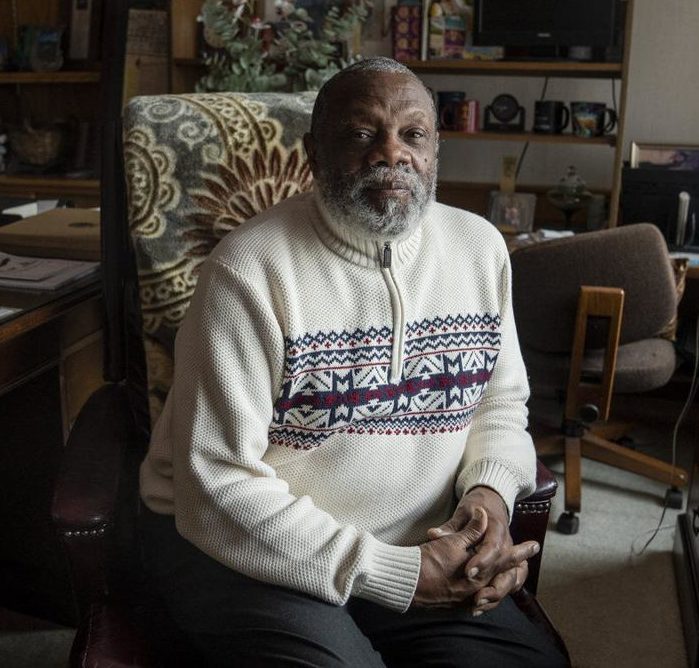Community Leader, Pastor Announces Run for Common Council Seat
By Deidra Williams
 If the Rev. Michael Chapman gets his way, Buffalo’s Ellicott District will remain represented by a pastor of a prominent majority Black church.
If the Rev. Michael Chapman gets his way, Buffalo’s Ellicott District will remain represented by a pastor of a prominent majority Black church.
Chapman, 70, the longtime pastor of St. John Baptist Church on Goodell Street, announced Monday that he is running for the Common Council seat now held by the Rev. Darius G. Pridgen.
Pridgen, the pastor of True Bethel Baptist Church on East Ferry Street, has announced he will not seek re-election to the seat he has held for 12 years.
Chapman says his background and familiarity with the Ellicott District, as well as the work he’s been doing in the community, particularly in the Fruit Belt neighborhood, makes him the best person to represent the district.
“I’m credentialed,” he said. “We have an extensive background in this community. Therefore, we believe that from the councilmatic district we would be better able to serve this community.” “I’m here to help the community,” he added.
Matt Dearing, 29, a former New York State Assembly staffer and organizer for Assemblyman Patrick Burke, announced last month he is running for the Ellicott District seat.
Chapman has served at St. John Baptist Church for about 40 years, including 20 years as senior pastor. A Grape Street resident, Chapman has been married to his wife Ina for 48 years, and they have five children, 30 grandchildren and four great-grandchildren.
Chapman is president and CEO of the Fruit Belt Community Development Corp. and the Buffalo Black Billion, a redevelopment project he established in 2002 to be an economic engine for East Buffalo through construction and renovation, programming and ministry.
The Buffalo Black Billion, a ministry of Chapman and his two churches, St. John Baptist and Gethsemane Missionary Baptist churches, seeks to invest $1 billion in East side redevelopment projects through government grants and private donations.
“We’re the strongest development institution anywhere in East Buffalo,” Chapman said. “We control 70% of the most valuable land here in the Fruit Belt other than the (Buffalo Niagara) Medical Campus,” he said. “So we are legitimate.”
Phase one of Buffalo Black Billion includes a future supermarket on four vacant lots on High Street in the Fruit Belt, Chapman said Monday.
The phase also includes two other projects: a $30 million renovation of St. John Towers apartments for low- and- moderate-income senior residents, whose rents are subsidized by the U.S. Department of Housing and Urban Development, and a $57 million renovation of McCarley Gardens apartment complex, long considered a model for low-income housing. The apartment complex sits on 15 acres bounded by Michigan Avenue and Oak, Goodell and Virginia streets. It is located near the medical campus.
About 10 years ago, Chapman and the church’s development arm had agreed to sell the parcel to UB for $15 million because of the apartment complex’s proximity to the medical campus. But the university changed its mind about acquiring the parcel, citing pressure from residents, community leaders and elected officials who said the residential community there should not be disturbed.
Phase one also includes a $160 million McCarley Gardens new build; $1.8 million for restoration work at Gethsemane Missionary Baptist Church; and $550,000 to renovate Recovery Options Made Easy mental health facility.
Phase two of the Buffalo Black Billion initiative seeks to redevelop the Jefferson Avenue corridor from Cherry to East Ferry streets, he said.
We are connected to this community, and we think the Fruit Belt will also cause the Jefferson vein to open up,” he said. “You’ve got a world-class medical campus. You need a world-class community.”
In addition, the city has designated St. John Baptist Church and the St. John Fruit Belt Community Development Corp. as a developer in the 36-block Fruit Belt neighborhood that stretches from Michigan to Jefferson avenues. His Fruit Belt involvement includes construction of dozens of low-income rental units, the High Street Market and a commercial center for the neighborhood.
A seat on the Common Council would speed up progress in East Buffalo, Chapman said.
“It will expedite it. Don’t want to be a part of (the renaissance). We are it,” he said.
What’s been accomplished in the Fruit Belt can be a blueprint for other East Side neighborhoods such as the Central Park and Broadway-Fillmore, he said.
“This model is not just a construction, brick and mortar,” he said.
“It actually deals with the emotions and the psychological makeup and the whole person.”